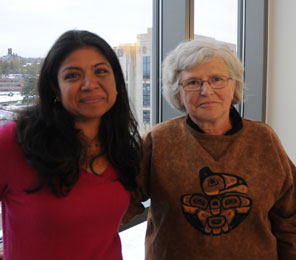 |
|
| Clinical Research Scholar Heena Santry, left, with her project mentor, Catarina Kiefe. | |
Acute care surgery (ACS) is a new medical specialty that combines elements of traditional trauma, critical care and non-trauma emergency surgery in the hope that it will reduce disparities and improve the quality of patient care. But since ACS was first described as a specialty, there has been much debate about its clinical scope and potential benefits for patient care. Surgeon-researcher Heena Santry, MD, assistant professor surgery and quantitative health sciences, is seeking greater clarity about how to best structure and deliver acute surgical care with a Clinical Research Scholar grant from the Center for Clinical and Translational Science (CCTS) at UMass Medical School.
With the five-year, $717,000 grant for her project “Acute Care Surgery Practice Patterns: Impact on Quality, Accessibility, and Costs of Care for Surgical Emergencies,” Dr. Santry will describe current trends in the implementation of acute care surgery teams and determine if an acute care surgery model can affect quality, accessibility and costs for non-trauma surgical emergencies (NTSEs) such as appendicitis or necrotizing fasciitis.
“Because ACS is a very new field, what it is at one hospital may differ a great deal from at another. Various approaches to ACS include 24/7 coverage for only non-trauma surgical emergencies, or for trauma and non-trauma together, and may or may not be associated with a trauma center or have providers trained in critical care,” explained Santry. “Those differences are what I’m trying to drill down to, then link to actual patient care outcomes, for a risk-adjusted model.”
One of the first surgeons in the country formally trained in the new specialty, Santry became an inaugural Clinical Research Scholar in 2010, the same year that UMMS was awarded a five-year, $20 million Clinical and Translational Science Award (CTSA) from the National Institutes of Health. The Clinical Research Scholar awards program is a pilot program of the CTSA-funded CCTS that combines coursework, seminars and mentored research with three to five years of financial support for investigators committed to careers in innovative, hypothesis-driven clinical and translational research.
Always interested in medicine because of its human and societal aspects, Santry majored in anthropology at Harvard College before earning her MD at UMMS in 2000. Her combined interests in trauma surgery and health services research coalesced during her surgical residency at the University of Chicago. While there she earned a master of science in health services as a Robert Wood Johnson Clinical Scholar, conducting outcomes research on the then-emerging field of bariatric surgery for weight loss. This experience, which provided two years in a structured environment with mentorship and coursework to foster success in health services research, fueled her passion to reduce disparities in care for unexpected surgical emergencies and improve the quality of emergency surgery.
|
Surgical Research Scholar series introduces QHS resources for health services research In work closely related to that of her Clinical Research Scholar grant, Heena Santry, MD, assistant professor of surgery and quantitative health sciences, has established a conduit for surgical residents to learn about the health sciences research methods and resources available to them at UMass Medical School.This summer, Dr. Santry launched the Surgical Research Scholars Program and Department of Quantitative Health Sciences Lecture Series on Health Services Research Methods. “Surgical residents who are spending two years doing health services research in order to train appropriately as academic surgeons need an infrastructure for that research,” said Santry. “With the expertise that the Department of Quantitative Health Sciences brought to this campus, I saw an opportunity for the residents to benefit from resources that hadn’t previously been formally integrated into their training.” Presented by QHS Chair Catarina Kiefe, MD, PhD, and other department faculty, the 12 lectures cover topics including methods for outcomes assessment; disparities, health policy and implementation research; epidemiology of vulnerable populations; internal review board regulations; writing a research proposal; and risk adjustment. “My goal in setting up the Surgical Research Scholars Program was to provide the infrastructure for research residents to make the most of the resources available at UMMS for health services research on the topics that they’re excited about,” said Santry. “They will probably have several surgical mentors, but this will ultimately allow a lot of cross-disciplinary collaboration.” |
|
Serving as Santry’s faculty mentor for her current project is Catarina Kiefe, MD, PhD, chair and professor of quantitative health sciences. “What you need to be a clinical health services researcher really doesn’t depend on your clinical specialty, but on the methods that you use. It has always been one of my own career goals to get young physicians into a career, regardless of their specialty, where they can use the tools of clinical epidemiology and statistics to do patient-relevant, socially relevant research,” said Dr. Kiefe. “In today’s health care environment, there is a strong push for accountability for what physicians do, of measuring the quality of care they deliver. What Heena is trying to do is assess how effective the new acute care surgery specialty is, and whether the care delivered to patients in general is improving because of the existence of the new specialty, which is exciting.”
With support from the CTSA infrastructure and mentorship from Kiefe and others at UMMS, Santry believes that her ambitious research goals are achievable. “The Clinical Research Scholar career award will enable me to, within five years, develop a framework for an organized approach to the study of ACS and NTSE, validate a risk-adjustment score for NTSE, and apply for independent R01 funding to support creation of a robust national registry,” she said.